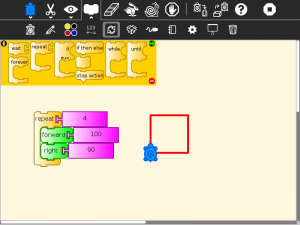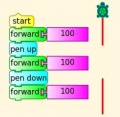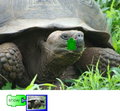Difference between revisions of "Activities/Turtle Art/Getting started"
< Activities | Turtle Art
Jump to navigation
Jump to search
m (→Getting Started: ditto) |
|||
| (11 intermediate revisions by 3 users not shown) | |||
| Line 1: | Line 1: | ||
==Getting Started== | ==Getting Started== | ||
| − | [[Image: | + | There are several Turtle Art manuals: |
| + | * [http://ht.ly/gqueN] | ||
| + | |||
| + | [[Image:New-TA-Repeat-block.png|300px]] | ||
Start by clicking on (or dragging) blocks from the Turtle palette. Use multiple blocks to create drawings; as the turtle moves under your control, colorful lines are drawn. | Start by clicking on (or dragging) blocks from the Turtle palette. Use multiple blocks to create drawings; as the turtle moves under your control, colorful lines are drawn. | ||
| Line 45: | Line 48: | ||
File:TA-box-eample.png|Named variables: store a variable in 'box' | File:TA-box-eample.png|Named variables: store a variable in 'box' | ||
File:Namedstacks.jpg|Named 'stacks' of blocks can be reused | File:Namedstacks.jpg|Named 'stacks' of blocks can be reused | ||
| + | File:ActionBlocks.png|When a new named stack is created, a new action block is added to the palette. | ||
File:Collapsestack.jpg|Collapse a 'stack' of blocks to save space | File:Collapsestack.jpg|Collapse a 'stack' of blocks to save space | ||
File:Pushpop.jpg|Store data in the first in last out heap using 'push' and 'pop' | File:Pushpop.jpg|Store data in the first in last out heap using 'push' and 'pop' | ||
| − | File:Turtlearray.jpg|Box names (and stack names) can be boxes, in this case | + | File:Turtlearray.jpg|Box names (and stack names) can be boxes, in this case (taken from the math-dice project), a one-dimensional array of 11 variables has been created. |
</gallery> | </gallery> | ||
| Line 54: | Line 58: | ||
File:Mathoperators.jpg |Math operators including + - * / mod sqrt | File:Mathoperators.jpg |Math operators including + - * / mod sqrt | ||
File:TA-if.png|Logical operations: flow control blocks accept >, <, =, and, not, or as input | File:TA-if.png|Logical operations: flow control blocks accept >, <, =, and, not, or as input | ||
| − | File:Pie2.png|Make pie charts | + | File:Pie2.png|Make pie charts [http://wiki.sugarlabs.org/go/File:Turtle_Art_Activity_pie_chart.ta] |
| − | File:Functionblock.jpg|Use Python functions, (accepts any of the [http://docs.python.org/library/time.html time] or [http://docs.python.org/library/math.html math] library functions) | + | File:Functionblock.jpg|Use Python functions, (accepts any of the [http://docs.python.org/library/time.html time] or [http://docs.python.org/library/math.html math] library functions) |
| + | File:Coordinates.png|Cartesian and polar coordinate grids | ||
| + | File:CM-coordinate-grid.svg|Centimeter coordinate grid (XO only) | ||
</gallery> | </gallery> | ||
| Line 62: | Line 68: | ||
File:Keyboardinput.jpg|Reading the keyboard | File:Keyboardinput.jpg|Reading the keyboard | ||
File:Keyboard.png|Converting the keyboard output to a string | File:Keyboard.png|Converting the keyboard output to a string | ||
| − | File:Entertermnumber.jpg|Entering a multi digit number, exits with the number in 'box 1', | + | File:Entertermnumber.jpg|Entering a multi digit number, exits with the number in 'box 1', [[http://wiki.sugarlabs.org/go/File:Turtle_Art_getnumber.ta]] |
File:Turtlemouse.jpg|Load the Python block with the sample code <i>push_mouse_event.py</i> to read mouse events | File:Turtlemouse.jpg|Load the Python block with the sample code <i>push_mouse_event.py</i> to read mouse events | ||
File:Printloudness.jpg|Read the microphone | File:Printloudness.jpg|Read the microphone | ||
File:Resistance.jpg|Read sensors plugged into the microphone socket [http://wiki.sugarlabs.org/go/Activities/TurtleArt/Using_Turtle_Art_Sensors] | File:Resistance.jpg|Read sensors plugged into the microphone socket [http://wiki.sugarlabs.org/go/Activities/TurtleArt/Using_Turtle_Art_Sensors] | ||
</gallery> | </gallery> | ||
Latest revision as of 18:22, 29 December 2012
Getting Started
There are several Turtle Art manuals:
Start by clicking on (or dragging) blocks from the Turtle palette. Use multiple blocks to create drawings; as the turtle moves under your control, colorful lines are drawn.
You add blocks to your program by clicking on or dragging them from the palette to the main area. You can delete a block by dragging it back onto the palette. Click anywhere on a "stack" of blocks to start executing that stack or by clicking in the Rabbit (fast) , Turtle (slow) or Bug (debug) buttons ![]() on the Project Toolbar.
on the Project Toolbar.
The basics
Drawing shapes
Displaying things
Boxes, Stacks and the Heap
(aka variables, subroutines and the stack)
Mathematics
Make pie charts [1]
































